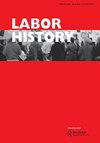行动自由还是工作自由?应对法属刚果棕榈油租界土著工人的流动性(1910-1940)
IF 0.7
4区 管理学
Q1 HISTORY
引用次数: 0
摘要
在法属刚果殖民地,劳资关系面临的主要挑战之一是需要调和促进本地工人流动的矛盾努力,同时也要稳定(或固定)劳动力。随着殖民雇主和官员的利益重叠和融合,土著工人的地位也随着行政和经济领导人对土著工作的分类而演变。因此,土著工人逐渐被归类为移徙工人、逃兵或流浪者。本应确保移徙工人流动的政治手段(通行证、工人日志、管制殖民地内劳动力流动的命令等)被错误地用于限制工人流动。本文利用法国殖民政府的档案和上刚果法语公司的私人档案,试图在殖民租界的背景下把握自由与(非)流动性之间的关系。在这方面,殖民地领导人试图控制人口流动,目的是建立当地劳动力市场、巩固政府理性和稳定殖民地秩序。本文章由计算机程序翻译,如有差异,请以英文原文为准。
Freedom of movement versus freedom of work? Coping with the mobility of indigenous workers in a palm oil concession in French Congo (1910-1940)
In colonial French Congo, one of the main challenges for labor relations was the need to reconcile contradictory efforts to promote the mobility of native workers while also stabilizing (or immobilizing) the workforce. As the interests of colonial employers and officials overlapped and merged, so did the status of indigenous workers evolve according to how administrative and economic leaders categorized indigenous work. Indigenous workers were therefore progressively categorized as migrant workers, deserters or vagrants. The political instruments which were supposed to ensure the circulation of migrant workers particularly (the laissez-passer, worker logbooks, orders regulating the flow of the workforce within the colony, etc.) were perversely used to constrain worker movement. Drawing on the archives of the French colonial administration and the private archives of the Compagnie Française du Haut-Congo, this article tries to grasp the relation between freedom and (im)mobility in the context of a colonial concession. In that context, colonial leaders sought to control of mobility for purposes relating to the construction of a local labor market, the consolidation of governmental rationality and the stabilization of colonial order.
求助全文
通过发布文献求助,成功后即可免费获取论文全文。
去求助
来源期刊

Labor History
Multiple-
CiteScore
1.00
自引率
28.60%
发文量
44
期刊介绍:
Labor History is the pre-eminent journal for historical scholarship on labor. It is thoroughly ecumenical in its approach and showcases the work of labor historians, industrial relations scholars, labor economists, political scientists, sociologists, social movement theorists, business scholars and all others who write about labor issues. Labor History is also committed to geographical and chronological breadth. It publishes work on labor in the US and all other areas of the world. It is concerned with questions of labor in every time period, from the eighteenth century to contemporary events. Labor History provides a forum for all labor scholars, thus helping to bind together a large but fragmented area of study. By embracing all disciplines, time frames and locales, Labor History is the flagship journal of the entire field. All research articles published in the journal have undergone rigorous peer review, based on initial editor screening and refereeing by at least two anonymous referees.
 求助内容:
求助内容: 应助结果提醒方式:
应助结果提醒方式:


